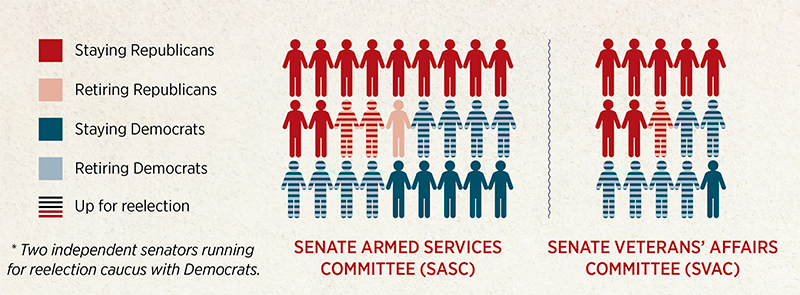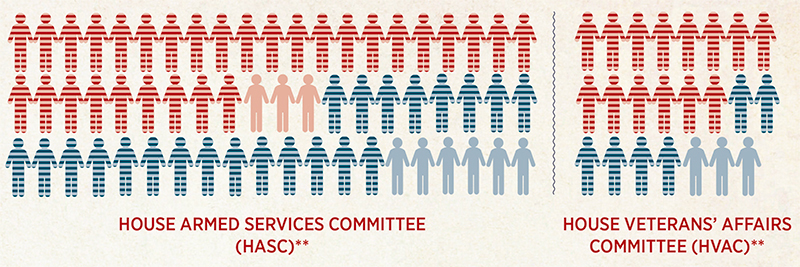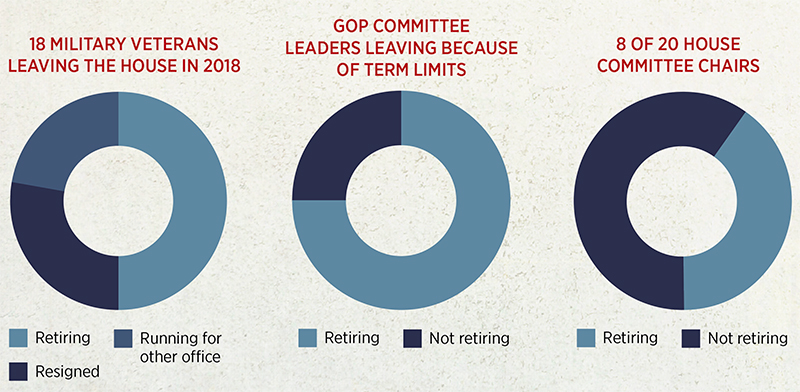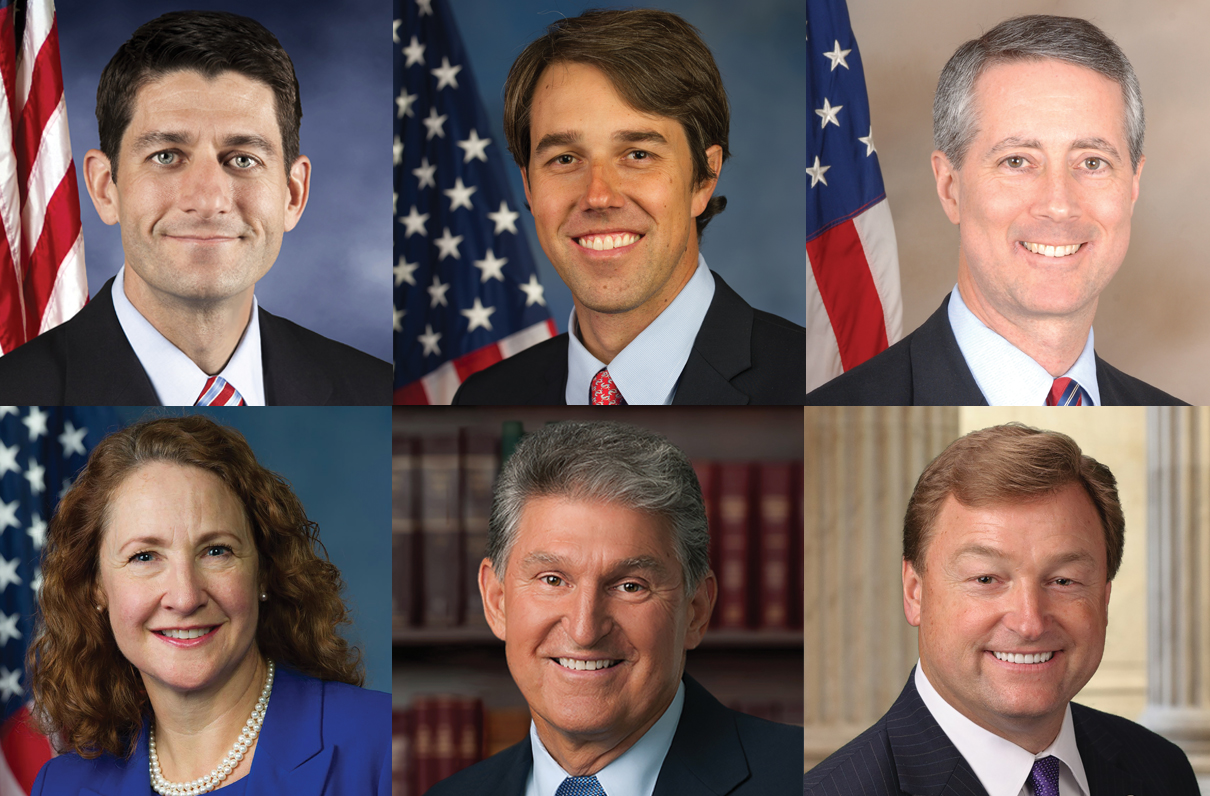Elections hold a certain electricity for MOAA. Both midterm and general elections pose strategic challenges and opportunities. While the nation loses experienced lawmakers, many of whom understand the unique commitment and challenges that come with military service, our association finds new champions for our legislative concerns.
Regardless of partisan power, one thing is certain: There will be big changes in store for the military and veteran communities. Those changes could mean new health care fees, changes to pay raises, or overhauls to other earned benefits.
The potential shift in power also means MOAA - and its members - must be ready to continue educating legislators and staff, to maintain a base of support, so we can answer when an opportunity to advance our legislative agenda knocks.
MOAA's government relations team is here to monitor our allies and opposition on Capitol Hill. We recognize being a veteran doesn't automatically make a legislator an ally. Some of our biggest antagonists over the years have been veterans; conversely, some of the biggest supporters of MOAA's issues have never worn a uniform. MOAA does not take any legislative relationship for granted. We know starting and nurturing relationships on all sides requires diligence, vigilance, and teamwork from you.
With that in mind, let's take a look at what we know right now.
The Senate
With a narrow majority in the Senate, expect a hot contest. Democrats have more vulnerable seats to defend this cycle - several in states that voted for President Donald Trump in 2016.
While there is a slim opportunity for Democrats and Republicans to share power, the likely outcome is that one party will have a majority. The majority-winning party will control the trajectory of legislation, confirm appointments, and draft budgets. In the event of an evenly divided Senate, Vice President Mike Pence will have to cast the tie-breaking vote. Even with the GOP in control, Pence cast nine tie-breaking votes in his first year in office. Since the 1870s, no vice president has done this more than nine times during his tenure.
Potential for Change
Senate Armed Services Committee (SASC)
The death of Sen. John McCain, chair of SASC, will be felt profoundly. He served on SASC for 31 years. MOAA honored McCain with its Col. Arthur T. Marix Award in 2004.
John Kyl, a former senator, has been chosen to fill McCain's seat. Kyl served in the House from 1987 to 1995 and in the Senate from 1995 to 2013. While in the House, he served on the Armed Services Committee.
Senate Veterans' Affairs Committee (SVAC)
Three senators on SVAC face tough reelections: Ranking Member Sen. Jon Tester (D-Mont.), Sen. Dean Heller (R-Nev.), and Sen. Joe Manchin (D-W.Va.). Tester was instrumental in crafting legislation allowing veterans to receive VA-funded health care in the private sector, expanding caregiver support programs, and reforming the VA appeals process - all of which MOAA supports.
Veterans
The Senate will lose two veterans in addition to McCain: Former Sen. Jeff Sessions (R-Ala.) has left and now serves as U.S. Attorney General, and Thad Cochran (R-Miss.) resigned in April, citing health concerns. The three senators take with them a combined 96 years of policy expertise.

The House
Although their party controls the majority of all three branches of government, at least eight GOP chairs of the House's 20 committees will retire this cycle, including House Speaker Paul Ryan (R-Wisc.). Six of the eight departing GOP committee leaders would be forced out of their roles in 2019 even if they weren't retiring because the House Republican caucus has rules limiting committee leaders' terms to give younger members a chance to ascend the leadership ranks. Losing a committee gavel means giving up a lot of power, which might be one reason 75 percent of these leaders are retiring.
Potential for Change
House Armed Services Committee (HASC)
HASC will lose at least twelve members as they retire, seek other office, lost reelection, or resigned from office. If Democrats flip the House in November, Rep. Mac Thornberry (R-Texas), current chair of HASC, would hand off his role. Thornberry has been one of MOAA's strongest supporters in trying to eliminate the widows tax on military survivors. He was awarded the Col. Arthur T. Marix Congressional Leadership Award in 2016.
Rep. Adam Smith (D-Wash.), currently the ranking member on the committee, would be the presumptive chair.
The Military Personnel Subcommittee, which oversees military pay and health care, will lose three of its five Democratic members to retirement; Republican Martha McSally, a 2018 MOAA Arthur T. Marix Award winner, is running for Senate.
House Veterans Affairs' Committee (HVAC)
There will be at least three new members of the HVAC: Ranking Member Tim Walz (D-Minn.) is leaving Congress to run for governor, Rep. Beto O'Rourke (D-Texas) is running for Senate, and Rep. Elizabeth Esty (D-Conn.) is retiring.
Walz, the highest-ranking enlisted member to serve in Congress, was instrumental in passing the Forever GI Bill. He was the 2014 recipient of MOAA's Col. Arthur T. Marix Congressional Leadership Award.

Veterans
In total, 18 veterans will have left the House in 2018: nine are retiring, five have resigned, and four are running for other office. Of the five members who resigned, three left to take jobs in the administration, and two left Congress amid allegations of misconduct.
The departures mark a continuing trend of fewer veterans in Congress. While military service should not be a prerequisite for elected office, MOAA has seen that having a working knowledge of the sacrifices of service often leads to more productive dialogue and better outcomes.
“It makes us more careful about going to war,” said Rep. Seth Moulton (D-Mass.), via email. “And that's supported by the statistics. It's also supported by my own experience in Congress. If you look at the debate over the authorization for the use of military force in Syria, it's consistently veterans on the Armed Services Committee who speak up and say, 'This is the responsibility of Congress. We need to have this debate before we decide to send or continue sending our young men and women into harm's way.' ”

Your Part
Plenty of political prognosticators are offering their two cents on the November election, noting the historical trend of a sitting president's party suffering losses during a midterm election. Some pollsters talk about a pending “blue wave.” Others cite a stable economy and recovering approval ratings for Republicans as reasons to look for an unexpected “Trump bump” at the ballot box.
We'll leave it to the experts at FiveThirtyEight, Gallup, Pew, and others to read the tea leaves about who will win. MOAA has earned a hard-won reputation on Capitol Hill for its political nonpartisanship; we neither endorse nor oppose candidates for political office.
Your membership matters. It helps us get a foot in the door on Capitol Hill. Will you be ready to answer a call for support?
